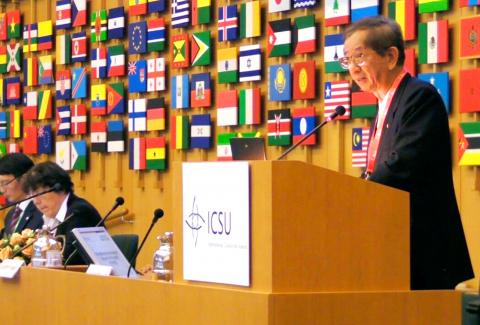Chemistry Nobel laureate Lee Yuan-tseh (李遠哲) assumed the presidency of the International Council for Science on Friday, becoming the first Taiwanese academic to take up a leadership post at the international scientific body.
A former president of Academia Sinica, Taiwan’s leading research institution, Lee is to serve a three-year term as president of the council, a non-governmental organization billed as the “UN of science.”
Speaking to 300 delegates at the council’s general assembly in Rome, Lee urged the world to tap the wisdom of ancient civilizations for solutions to rampant development and pollution.

Photo: CNA
Excessive human activity has put the environment in peril, Lee said, reminding his audience that the ultimate goal of science and technology was to create a better world and not just financial gain.
Lee will be pushing several major scientific projects during his three-year term and will be responsible for planning a scientific department for the UN Conference on Sustainable Development in Rio de Janeiro next year.
He was elected council president at the last general assembly in Mozambique in 2008.
Academia Sinica president Wong Chi-huey (翁啟惠) said in Rome that Lee’s position as council president would be beneficial to Taiwan and that it would also greatly encourage young scientists in the country.
Chou Chang-hung (周昌弘), a researcher at the institution who was also in Rome for the council’s general assembly, said he expected that Lee’s appointment would elevate Taiwan’s presence in the international community.
The mission of the council, founded in 1931, is to facilitate international cooperation in the advancement of science and to improve the well-being of humans.
Its members include 121 national scientific bodies and 30 international scientific unions.

DEFENSE: The first set of three NASAMS that were previously purchased is expected to be delivered by the end of this year and deployed near the capital, sources said Taiwan plans to procure 28 more sets of M-142 High Mobility Artillery Rocket Systems (HIMARS), as well as nine additional sets of National Advanced Surface-to-Air Missile Systems (NASAMS), military sources said yesterday. Taiwan had previously purchased 29 HIMARS launchers from the US and received the first 11 last year. Once the planned purchases are completed and delivered, Taiwan would have 57 sets of HIMARS. The army has also increased the number of MGM-140 Army Tactical Missile Systems (ATACMS) purchased from 64 to 84, the sources added. Each HIMARS launch pod can carry six Guided Multiple Launch Rocket Systems, capable of

Authorities have detained three former Taiwan Semiconductor Manufacturing Co (TMSC, 台積電) employees on suspicion of compromising classified technology used in making 2-nanometer chips, the Taiwan High Prosecutors’ Office said yesterday. Prosecutors are holding a former TSMC engineer surnamed Chen (陳) and two recently sacked TSMC engineers, including one person surnamed Wu (吳) in detention with restricted communication, following an investigation launched on July 25, a statement said. The announcement came a day after Nikkei Asia reported on the technology theft in an exclusive story, saying TSMC had fired two workers for contravening data rules on advanced chipmaking technology. Two-nanometer wafers are the most

TRAJECTORY: The severe tropical storm is predicted to be closest to Taiwan on Wednesday and Thursday, and would influence the nation to varying degrees, a forecaster said The Central Weather Administration (CWA) yesterday said it would likely issue a sea warning for Tropical Storm Podul tomorrow morning and a land warning that evening at the earliest. CWA forecaster Lin Ting-yi (林定宜) said the severe tropical storm is predicted to be closest to Taiwan on Wednesday and Thursday. As of 2pm yesterday, the storm was moving west at 21kph and packing sustained winds of 108kph and gusts of up to 136.8kph, the CWA said. Lin said that the tropical storm was about 1,710km east of Oluanpi (鵝鑾鼻), Taiwan’s southernmost tip, with two possible trajectories over the next one

CHINA’s BULLYING: The former British prime minister said that he believes ‘Taiwan can and will’ protect its freedom and democracy, as its people are lovers of liberty Former British prime minister Boris Johnson yesterday said Western nations should have the courage to stand with and deepen their economic partnerships with Taiwan in the face of China’s intensified pressure. He made the remarks at the ninth Ketagalan Forum: 2025 Indo-Pacific Security Dialogue hosted by the Ministry of Foreign Affairs and the Prospect Foundation in Taipei. Johnson, who is visiting Taiwan for the first time, said he had seen Taiwan’s coastline on a screen on his indoor bicycle, but wanted to learn more about the nation, including its artificial intelligence (AI) development, the key technology of the 21st century. Calling himself an